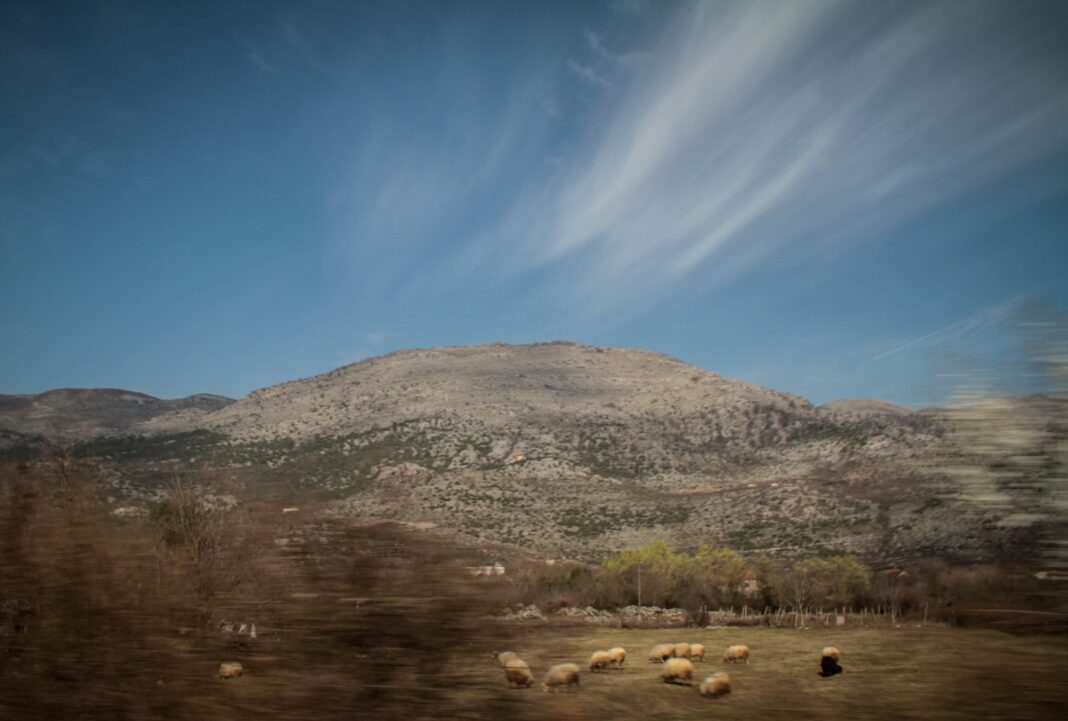Text and photos by Matthias Canapini* – Unimondo**
This eighth episode is set in Albania (read previous episodes here: first, second, third, fourth, fifth, sixth, seventh)
In April 2019, following the main migrant and refugee routes along Europe’s borders, I spent about ten days intermittently in Albania. I share with you an excerpt of this choral story, collected between mountain passes and “border” countries.
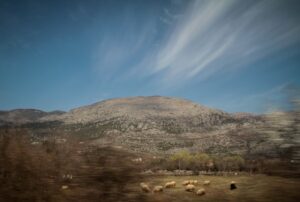 It is the country where you never die. Fortified by endless hours spent at the table, soaked in raki, disinfected by the heat of the ubiquitous greasy olives, bodies here acquire a robustness that defies all tests. This is Albania, no fooling around. After years, I return to the “land of the eagles” thanks to the words of the Albanian (French naturalised) writer Ornela Vorpsi, taken from the introduction to her book “The Land Where You Never Die.” I close the paperback on page 28 as the ferry groans into the port of Durres. The mealy floods drink freely: it is the first day of rain after a month of drought. In my mind I find chaotic Albania, with its banana sellers, barefoot gipsies and non-existent trains; in its architecture, I sense an avant-garde, globalising impulse.
It is the country where you never die. Fortified by endless hours spent at the table, soaked in raki, disinfected by the heat of the ubiquitous greasy olives, bodies here acquire a robustness that defies all tests. This is Albania, no fooling around. After years, I return to the “land of the eagles” thanks to the words of the Albanian (French naturalised) writer Ornela Vorpsi, taken from the introduction to her book “The Land Where You Never Die.” I close the paperback on page 28 as the ferry groans into the port of Durres. The mealy floods drink freely: it is the first day of rain after a month of drought. In my mind I find chaotic Albania, with its banana sellers, barefoot gipsies and non-existent trains; in its architecture, I sense an avant-garde, globalising impulse.
Waiting for me in a small courtyard on Via Ruga Don Bosco is Ariela Mitri, head of the human trafficking and migration department of the Italian Catholic NGO Caritas. She is resolute, speaks perfect Italian and gives me a motherly welcome: “The Balkan route is used every day. Instead of going through Macedonia, they go north-west. The entry front is southern Albania, the exit front is northern Albania. Those who do not attempt the impassable road through the Kosovan mountains concentrate around Shkodra in the north. It may be that the memory of our exodus is still fresh, it may be that we experienced the war in Kosovo on the front line, but when it comes to migrants, Albania does not suffer from public pressure. We tend to show solidarity. Policemen make themselves useful by cleaning toilets or sharing food with illegal immigrants at the border. It is not talked about much, but there is a lot of help. We have earmarked money for the management and innovation of the reception centres because Caritas was there during the Hoxha regime, it was there during the civil war and it is still there today, at a time when the other is our brother. Some families are even starting to stop… Despite the socio-economic difficulties, they plan to build a new life in Tirana, Vlora or elsewhere. In 2017, according to the latest report published by the European Commission, 309 migrants applied for political asylum in Albania, a figure slightly higher than the previous year.”
We arrive in Shkodra in the evening. Snow-capped mountains rise on the horizon, the cradle of the Kanun, Lekё Dukagjini’s code of honour. The Panda 4×4 of Christian, a Caritas worker with a proud look on his face, mumbles at the gate of the Peace Village, some twenty cosy bungalows that serve as guest quarters. Black and Aleppo pines dominate the lake, the Roma quarter below, and the immaculate mosque. “Once home to Kosovar refugees, this reception centre now houses Afghans, Syrians and Iraqis. Caritas set it up in the 1990s when I was born. – I know that the last families in transit left five days ago, they were stopped a few kilometres from Shkodra. Some do not ask for asylum, despite the pamphlets given to them by the police; others, more fortunate, end up waiting in the temporary centres in Tirana. Caritas organises the transfer of asylum seekers and feeds and comforts all the others.
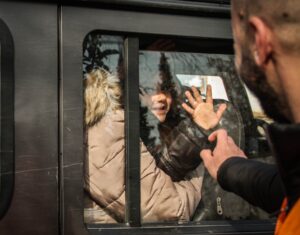
At midnight I catch a glimpse of ten adults and two immature bodies slipping past the cabin door. I met the elusive silhouettes at breakfast. “Greece is no good. I spent six months in prison. The cops left me with nothing but my shoes and a pile of incomprehensible papers. We left Korçë days ago but were caught and identified near Shkodra. Tomorrow morning we will be transferred to Tirana, where we will apply for political asylum,” says Ali, who grew up between Baghdad and Fallujah. “But our final destination is Germany,” breaks in Mustafa, a former bricklayer, his biceps braced by a tight sweatshirt. The rest of the group smiles, visibly relaxed. No one else speaks English; we trudge along, grimacing, making small gestures of politeness. At customs in Han I Hotit, the border between Albania and Montenegro, something doesn’t feel right: a Kurdish man with a German passport is ordered to turn around. The grey domes of the dictatorship’s bunkers sprouted like dead mushrooms. Seven hundred and fifty thousand to be exact, built during the Cold War and scattered all over Albania at the behest of Enver Hoxha, who ruled the country from 1944 to 1985. Some are overgrown with ivy and rubbish, filled with the faeces of bleating sheep. “The migrants head north, always north, following the tracks of the disused railway or, in the opposite direction, the electric poles that connect Podgorica to Tirana.
See those dusty mule tracks up there? They run through the highlands, although the chances of getting caught are much higher. Fortunately, the local police do not behave badly, they warn us and we intervene. In summer, the paths are full of tracks and it is easy to see them climbing and disappearing in the bushes. But it is impossible to forget their stories. Sometimes you have to raise your head to see people instead of numbers,” admits Cristian, staring at a mutilated dog. “Father Adrian works in the village. Sometimes he finds young people and families sleeping in the churchyard. We cannot look away. The Balkans is a sieve, the routes uncontrollable. Thirty-four more people arrived in Gjirokastër this morning”. The large lake is punctuated by the jumps of trout, which, after taking flight, leave concentric circles to die on the surface.
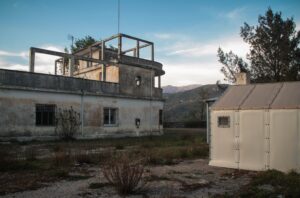
“When someone is seen, they try to run away. It is normal and instinctive, I would do the same. It is important to understand that they are walking alone, for days, in a foreign country. We try to calm them down and respect them as we would ourselves,” confides Gramos, a customs officer in the far southeast of Albania. “In the temporary reception centre for migrants in transit, we have a few cots, a kitchenette and an additional outdoor hut to cope with the summer influx of up to eighty people daily. When we stop migrants passing through on the many paths that cut through the hills, we turn a blind eye and warn Aida, the Caritas worker who lives in Bilisht, a hamlet in the municipality of Devoll, nine kilometres from Krystallopigi (the Greek border). Instead of handing them over to customs, Aida took care of them by taking them into her parish. As illegal immigrants, she still has to lock them up in their rooms or on the first floor of the building, but it is better than leaving them in a cage in the middle of nowhere.”
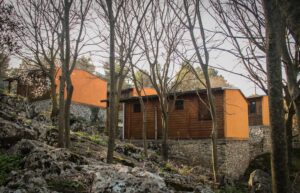
Winter’s grip is still on the small houses of Bilisht, a population of three thousand. I knock on the door of the Franciscan Sisters of the Gospel, the social soul of the hamlet. Sister Silvia, Sister Gabriela and Sister Margaret are passionately saying the Hail Mary and lighting a candle to thank the Lord for giving them another day. I follow them outside, the door of the house left ajar. “For the past two years, the exile route has been reopened. The town of Gjirokastër (easier to reach from Athens) used to be the busiest, but now many prefer to go through Bilisht. The police patrol the roads and hide CCTV cameras in the bush, but I can assure you that they would let everyone through if they had their way. As well as supporting the right to migrate, we work in the neighbourhood to bring comfort to the most vulnerable. If you only knew how many prayers they ask us… It’s our way of spreading energy and good practices.”
At the corner of Sefedin Gora Street, we intercepted Mrs Aida, the same one described by Gramos. The three sisters are slipping into the ward of a block of flats, Bible in hand. “I live on relationships and deep faith. I remember an Iraqi family leaving with tears in their eyes because of the hospitality they received in Bilisht. Their youngest son, only three months old, had contracted a severe case of pneumonia while crossing the mountains at night. I insisted on taking the baby and his mother to the hospital in Korçë, despite the procedure against it. I visited them every day, while the woman’s companion and two other children were looked after by Altin, my husband. We know what it means to emigrate and to grit our teeth to survive.”
Dodging cow dung and free-range chickens, we reach a barren plateau carved by streams: a little piece of Ireland transplanted into the heart of the Balkans. On the horizon there is a white strip, apparently twenty metres wide, where – Altin will tell me – the multinational TAP has assembled another section of a colossal gas pipeline that started in Baku, swelled in Turkey and is ready to land in the province of Lecce, in Italy. To get the pipeline through, the company destroyed the last remains of an Ottoman cemetery, protected by scholars and devotees; the workers realised this by stumbling over the bones of the dead. “When the communist dictatorship fell, I emigrated to Greece. I was treated like an animal and made fun of, and I don’t want that to happen to the people who pass through here. Until thirty years ago, this plateau was forbidden and impenetrable, surrounded by armed guards, barbed wire and lush fruit trees. For decades we lived off the grid, and finally, in 1990-1991 the walls began to give way. After years of misery, there was a massive exodus. Food was scarce, and if you had more than enough, you were accused of being a spy. You only worked for the state, which had privatised everything. There were some positive aspects of Hoxha’s regime, such as the total absence of prostitution and drug trafficking; schools and hospitals functioned and were free but at the expense of the freedom of the Albanian people. That is why I understand the migrants of today. We have been through it all: to talk in public about politics or to have a relative abroad was a stigma, a good reason to be sent to some re-education camp in the middle of the mountains.”
* Matthias Canapini was born in Fano, central Italy, in 1992. He travels at a slow pace to tell stories with his notebook and camera. He has published five books since 2015 and is currently a news editor and reporter for the news outlet Unimondo
** Unimondo, founded on 10 December 1998 under the auspices of the Fontana Onlus Foundation, is an online news outlet dedicated to providing authoritative content on peace, sustainable human development, human rights and environmental issues. It offers diverse and timely information, amplifying the voices of different facets of Italian and global civil society. As the Italian hub of the OneWorld network, founded in London in 1995, it is part of a global network with 11 centres worldwide and 1,600 partner associations



















